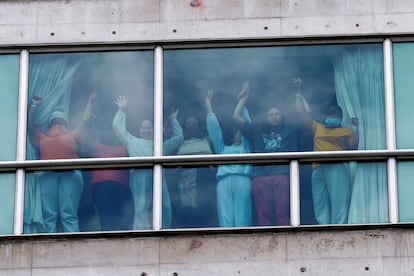Will Trump deport migrants to Libya? What you should know
The Administration has hinted at a deal with the North African country, despite its record of human rights violations and a court order that blocked it

The Trump administration’s latest attempt to expand its controversial deportation program has provoked a strong response after it emerged that migrants in U.S. custody were being prepared for deportation to Libya, a North African country with a history of human rights abuses. Immigrant advocates, a federal judge and even Libyan authorities have warned that such transfers would violate both legal and ethical standards.
Deportations to Libya?
According to several U.S. officials who spoke under condition of anonymity with Reuters and the Associated Press, the Trump Administration planned to deport non-Libyan immigrants on a U.S. military flight —possibly a C-17— to Libya on May 7. The nationalities of those affected reportedly included people from Vietnam, Laos, the Philippines and Mexico.
Reports mention the case of the family of Valentin Yah, a Mexican national held in a Texas detention center. His family claims that he was pressured to sign documents consenting to his deportation to Libya, although he asked to be returned to Mexico.
The administration has not clarified how many people might be affected or what the legal basis is for deporting people to countries of which they are not citizens. When asked about the Libya reports, President Donald Trump simply deflected attention and told reporters, “You’ll have to ask Homeland Security.”
Judicial intervention
The legal basis for the move soon came into question. U.S. District Judge Brian Murphy, who had already ruled in March that migrants must be allowed a “meaningful opportunity” to challenge deportation to non-native countries, reaffirmed that any removal to Libya “would clearly violate this Court’s Order.” He rejected arguments that the Pentagon, not the Department of Homeland Security (DHS), could carry out such removals, arguing that the administration could not circumvent court orders by alternating responsibilities between departments.
Murphy also ordered the administration to submit information on who might be affected and the legal justifications for the deportation plans. He further stated that such removals would violate court orders protecting migrants from being sent to countries where they could face persecution or torture.
Lawyers representing detained migrants filed emergency motions to block the removals, arguing that some detainees were subjected to coercive tactics, such as solitary confinement, to force them to sign deportation waivers. According to the lawyers, at least six detainees in Texas were told their destination was Libya, despite the fact that none had Libyan nationality.

Libya responds
The move provoked a swift diplomatic reaction in Libya itself. The country’s two rival administrations — the U.N.-recognized Government of National Unity in Tripoli and the Libyan National Army of Khalifa Haftar, which controls the east — denied any agreement with the United States to accept deportees.
“There will be no acceptance or reception of them on the territories secured by the Libyan Armed Forces, whatever the reasons and justifications,” the Libyan Army said in a statement.
Prime Minister Abdul Hamid Dbeibah’s government in Tripoli stressed that there had been “no deal or coordination” and warned that any attempt to use Libya as a destination for migrants under U.S. arrest would be rejected.
The U.S. State Department declined to comment on diplomatic arrangements, while Department of Homeland Security Secretary Kristi Noem said she “can’t confirm” media reports of deportations in Libya.

Human rights in Libya
Sending migrants to Libya represents an escalation in the Trump administration’s approach to deportations to third countries, which have already involved controversial removals to El Salvador, Panama and Costa Rica. In those cases, hundreds of migrants were sent to countries where they had no citizenship, family or legal protection.
However, Libya stands out for its record of human rights violations. Various reports by Amnesty International, the U.S. State Department, and UN researchers have documented widespread abuses in Libya’s migrant detention centers, including sexual violence, torture, extrajudicial killings, and forced labor. In 2021, Amnesty described conditions there as “horrific.”
Despite this, the Trump administration has framed deportations to countries like Libya as a way to deter migrants seeking to enter U.S. territory. Secretary of State Marco Rubio recently stated, “The further away from America, the better,” while advocating for new deportation agreements with countries willing to detain migrants on behalf of the United States.
For now, the court ruling halts any immediate removal, but it remains unclear how far the administration is willing to take its deportation policies, or whether it will continue to seek informal agreements with unstable or abusive regimes.
Sign up for our weekly newsletter to get more English-language news coverage from EL PAÍS USA Edition
Tu suscripción se está usando en otro dispositivo
¿Quieres añadir otro usuario a tu suscripción?
Si continúas leyendo en este dispositivo, no se podrá leer en el otro.
FlechaTu suscripción se está usando en otro dispositivo y solo puedes acceder a EL PAÍS desde un dispositivo a la vez.
Si quieres compartir tu cuenta, cambia tu suscripción a la modalidad Premium, así podrás añadir otro usuario. Cada uno accederá con su propia cuenta de email, lo que os permitirá personalizar vuestra experiencia en EL PAÍS.
¿Tienes una suscripción de empresa? Accede aquí para contratar más cuentas.
En el caso de no saber quién está usando tu cuenta, te recomendamos cambiar tu contraseña aquí.
Si decides continuar compartiendo tu cuenta, este mensaje se mostrará en tu dispositivo y en el de la otra persona que está usando tu cuenta de forma indefinida, afectando a tu experiencia de lectura. Puedes consultar aquí los términos y condiciones de la suscripción digital.









































